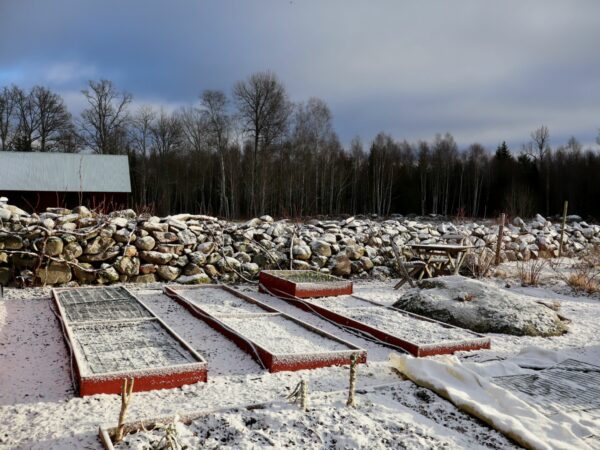Gardening for Beginners: When to Harvest Onion?
It's summer and alliums are in season! I especially love homegrown bulb onions like the yellow, red and white varieties. But when is it time to harvest onion? Keep reading to find out.

It was just about time to harvest onion in my garden! A lovely little cluster of newly harvested onions that I used for our dinner. We had beef patties with pan-fried onion and mashed potatoes. A Swedish classic!
Thankfully, my onions are doing a lot better now than they did the past few years. I was actually getting worried about them especially after 2018, when it was extremely hot and dry outside. My onions developed so slowly that year and were basically the size of onion sets. This year seems to be different though! I can actually start harvesting the onions in my polytunnel already and even have scallions and shallots around.
From looking at the questions in the comment sections on my platforms, I noticed that plenty of you grow onions and other alliums too. The most common question seems to be about when it's time to harvest onion. So, that's what I'm writing a bit more about today!
Read more: Growing early onion in the polytunnel
Fresh onion
We can generally say that the onion is ready when you think it's grown large enough. It doesn't actually have to reach a certain size or stage of development. A smaller and tender onion might for example be the perfect ingredient in a nice salad. I think it's more fun to harvest the onion when it's larger than an onion set though.
A good tip is to use a particularly fast-growing onion that you can harvest fresh in summer. Then you can leave the other varieties that are fit to store until later.
Harvest onion bulbs by carefully twisting and pulling the onions from the soil. Remove the roots and the dry papery outer layer. You can use both the bulb and the onion tops in your cooking. Delicious!
Read more content for beginners: Starting a small vegetable garden part 1
Storing onion
Onions are actually really good at communicating when it's time to harvest them. There are quite a few telltale signs. For example that the onion tops start to slouch. You can't really interpret this sign any other way. When the onion does this, it indicates that the onion gets ready for a period of rest. The first stage of this process is that the leaves lose their vitality and bend down to an angle of 90 degrees.
When this happens, you might want to keep an eye on both the onion and the weather. If it's dry outside, then you can leave the onion in the soil for a few more days to dry. After that, you harvest the onion and put it on the ground or in another completely dry spot to continue the process. But make sure to keep the onion tops where they are! This means that the onion blocks the entrance to the bulb itself naturally, so that for example bacteria can't get in. You can store the onions a lot longer if you don't cut the tops.
Read more: Beginner's guide to growing vegetables

The leaves start to slouch very quickly.

The leaves bend down to the ground.

I'm drying my onions outside before I store them inside.
Harvest onion...
- when the tops are green and healthy, and the onion has grown larger than the onion set
- when the tops go yellow and start to slouch
More: I harvest garlic in spring

The homegrown onions won't be as big as the ones from the store, but they taste so much better!
The onion I'm showing in this post was grown in the small polytunnel. My experience growing onions (yellow onion, that is) in a greenhouse is that we often get plenty of tops and smaller bulbs than we do outside. I believe this is because it's often too hot and a little bit too dry in my greenhouse for the onions to grow properly. The early onion harvest is more than welcome even if the onions aren't huge though.
/Sara Bäckmo



Leave a Reply
You must be logged in to post a comment.